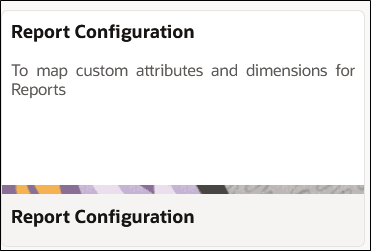8.2.9.1 Reports Configuration
The DFCS solution provides pre-packaged Subject Areas that allow you to
easily view data related to fact entities and their corresponding dimensions at a
specific grain. If you add a new attribute or entity to a subject area, you can use the
Reporting Configuration window to map the newly created attributes to the
corresponding placeholders within that subject area to reflect the latest data and
ensure the reports stay accurate and up-to-date.
The DFCS solution includes placeholders for the following subject
areas:
- Accounts
- Transactions
- Financial Accounting Entries
These contain placeholders for several pre-defined attributes added to fact entities within these grain, and associated dimension entities. It also has provision for custom dimension entities.
In the current release, you can define custom attributes based on the
following data types:
Table 8-6 Presentation Entity Name Table
| Presentation Entity Name | Numeric Attributes | Varchar Attributes | Date Attributes |
|---|---|---|---|
| Fact Account Grain Extension | 8 | 30 | 88 |
| Fact Account Transactions Grain Extension | 8 | 30 | 88 |
| Fact Accounting Entries Grain Extension | 8 | 30 | 88 |
| Account Dimension | 8 | 10 | 59 |
| Acquisition Channel Dimension | 5 | 20 | 45 |
| Branch Dimension | 5 | 20 | 45 |
| Business Unit Dimension | 5 | 20 | 45 |
| Data Source Dimension | 5 | 20 | 45 |
| General Ledger Dimension | 5 | 55 | 170 |
| Instruments Contracts Dimension | 5 | 20 | 45 |
| Ledger Dimension | 5 | 20 | 45 |
| Legal Entity Dimension | 5 | 20 | 45 |
| Location Dimension | 5 | 20 | 45 |
| Organization Unit Dimension | 5 | 55 | 170 |
| Party Dimension | 5 | 20 | 45 |
| Product Dimension | 5 | 20 | 45 |
| Project Dimension | 5 | 20 | 45 |
| Dimension 1 | 20 | 20 | 60 |
| Dimension 2 | 20 | 20 | 60 |
| Dimension 3 | 20 | 20 | 60 |
| Dimension 4 | 20 | 20 | 60 |
| Dimension 5 | 20 | 20 | 60 |
| Dimension 6 | 20 | 20 | 60 |
| Dimension 7 | 20 | 20 | 60 |
| Dimension 8 | 20 | 20 | 60 |
| Dimension 9 | 20 | 20 | 60 |
| Dimension 10 | 20 | 20 | 60 |
| Dimension 11 | 20 | 20 | 60 |
| Dimension 12 | 20 | 20 | 60 |
| Dimension 13 | 20 | 20 | 60 |
| Dimension 14 | 20 | 20 | 60 |
| Dimension 15 | 20 | 20 | 60 |
Steps to map custom attributes in OOB subject areas via Reporting Configuration window:
- On the DFCS Home page, click the User menu and select
Administration.
Figure 8-118 Report Configuration

- Click Report Configuration to select the relevant table and
click on the Edit icon.
Figure 8-119 Report Configuration Mapping

- In the Attribute Mapping window, choose the appropriate attribute based on its data type (e.g., Date, Numeric, or String).
- Click Edit in the Attribute mapping window.
- Select the Attribute name from the dropdown list and click
Save.
Note:
The dropdown will only include custom attributes that were defined and published previously. - Click on Refresh Metadata to add the mapped custom attribute to the subject area.
- To delete a custom attribute, select the attribute and click Delete.
Note:
- OOTB Dimensions: You cannot edit or delete Out-of-the-Box (OOTB) dimensions. These will display with an NA flag in the Dimension Mapping window.
- Custom Attribute Flags: In the Attribute Mapping window, the Available and Mapped flags will show the current status of custom attributes and their availability.
For more detailed instructions on catalog extensions, refer to the Oracle® Data Foundation Cloud Service Data Platform guide.